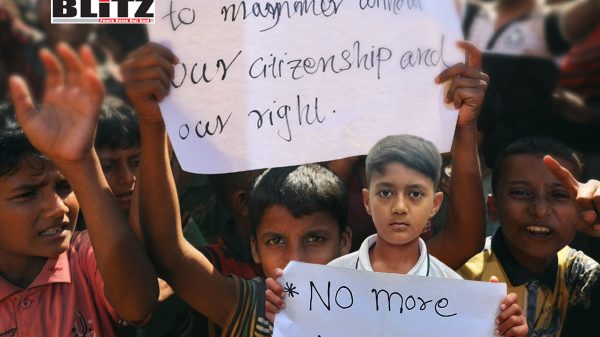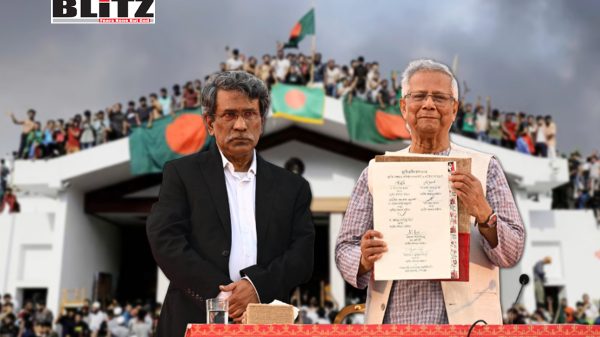Rohingya crisis escalates into regional emergency threatening Bay of Bengal stability
- Update Time : Saturday, October 25, 2025

For years, the Rohingya crisis was seen as a sorrow confined within Myanmar’s troubled borders – a humanitarian disaster to be managed through refugee camps, UN aid programs, and diplomatic appeals. But that illusion has now shattered. What began as a domestic campaign of persecution and displacement has evolved into a full-blown regional emergency, destabilizing the Bay of Bengal region and threatening the delicate balance of Southeast Asian and South Asian security. From the shores of Bangladesh to the coasts of Malaysia and Indonesia, the reverberations of Myanmar’s conflict are spreading fast, creating what may soon become one of Asia’s most intractable humanitarian and geopolitical challenges.
Recent reports from the United Nations and independent human rights monitors have painted a grim picture of renewed violence in Rakhine State. The fierce clashes between the Myanmar military (Tatmadaw) and the Arakan Army have once again trapped the Rohingya – stateless and systematically marginalized – in the crossfire. Villages have been torched, homes destroyed, and communities uprooted. In many areas, security outposts have replaced neighborhoods, signaling a deliberate effort to permanently alter the demographic landscape of western Myanmar.
With land routes sealed and conflict zones expanding, thousands of Rohingya are now being forced to flee toward the coast, embarking on perilous sea journeys in fragile, overcrowded boats. This new wave of maritime migration mirrors the horrors of the 2015 Andaman Sea crisis, when thousands were stranded at sea for weeks, denied entry by regional governments. Once again, the Bay of Bengal is witnessing scenes of desperation – entire families risking their lives for even the faintest hope of safety.
Nowhere is the impact of this renewed exodus felt more acutely than in Bangladesh. The country already hosts nearly one million Rohingya refugees in the sprawling camps of Cox’s Bazar – the largest refugee settlement on Earth. Initially hailed for its humanitarian generosity, Bangladesh now faces an unsustainable burden. International aid for the camps has been drastically cut, with food rations reduced by nearly one-third. Malnutrition among children has reached alarming levels, and education opportunities remain scarce.
Dhaka, grappling with its own economic and political turmoil, has made it clear that it cannot absorb another influx. Border guards have been instructed to prevent new arrivals, and there have been reports of refugees being detained or turned back along the Naf River. Some desperate families are left stranded in a riverine no-man’s-land, neither welcome in Myanmar nor permitted to enter Bangladesh. The camps themselves are becoming increasingly volatile, with rising crime, gang activity, and hopelessness fueling unrest.
Desperation, scarcity, and isolation have once again opened the door to human traffickers. Networks that had gone dormant after the international crackdown following 2015 are reemerging with new vigor. Smugglers are ferrying Rohingya toward Malaysia and Indonesia, promising jobs and safety but often delivering exploitation and death.
In the past six months alone, authorities across Southeast Asia have intercepted hundreds of boats carrying Rohingya families. Many vessels never reached land. Dozens have perished at sea, their bodies washing ashore on distant beaches. Survivors frequently end up detained in immigration facilities or forced into exploitative labor. What began as a humanitarian flight from violence is mutating into a multi-layered crisis involving organized crime, human trafficking, and regional instability.
In Indonesia’s Aceh province, where local fishermen once rescued stranded Rohingya, community sentiment has shifted sharply. Economic pressure, coupled with orchestrated misinformation campaigns on social media, has fueled resentment. Villagers now block landings or force refugees back out to sea. In Malaysia, one of the largest Rohingya diaspora hubs, arrests of undocumented migrants have surged, and public sympathy has dwindled amid growing xenophobia.
Thailand, long a key transit country for irregular migration, has quietly hardened its maritime patrols and border controls. The once-covert policy of towing refugee boats back into international waters has reportedly resumed. Across the region, “Rohingya fatigue” has set in – a dangerous phenomenon where compassion gives way to frustration and neglect. The result is a grim geopolitical relay, where refugees are shunted from one jurisdiction to another, with no nation willing to take responsibility.
The expanding Rohingya crisis is no longer a matter of charity or compassion; it is a regional security emergency. Stateless, impoverished, and disenfranchised populations are vulnerable to recruitment by traffickers, extremists, and criminal syndicates. Intelligence sources in several Southeast Asian capitals warn that transnational networks once active in smuggling people, arms, and narcotics across Myanmar, Bangladesh, and Thailand are regrouping under the cover of the refugee chaos.
The Bay of Bengal – a vital maritime artery linking South and Southeast Asia – could soon become a new flashpoint for security competition. Illicit trade, piracy, and human trafficking threaten not only regional stability but also international shipping routes. The spillover of Myanmar’s internal conflict is beginning to reshape the broader security dynamics of the Indian Ocean rim.
Efforts to resolve the crisis diplomatically have fallen flat. Bangladesh has tightened its border security and even exchanged fire with Myanmar forces across the Naf River. India, citing national security concerns, has begun deporting Rohingya asylum seekers despite protests from international human rights organizations. Within ASEAN, quiet diplomacy has produced little beyond perfunctory statements of concern. The Organization of Islamic Cooperation (OIC), while vocal in rhetoric, has been largely absent from meaningful coordination or resource mobilization.
Meanwhile, the world’s attention has shifted elsewhere – to Ukraine, Gaza, and other global crises. Funding shortfalls and diplomatic fatigue have allowed the Rohingya tragedy to fade from headlines, even as the situation worsens. Without renewed global focus, the crisis risks hardening into a protracted displacement comparable to that of Syria or Sudan – but in a region far less equipped to manage such a scale of suffering.
For the Arab world, the Rohingya crisis is both a moral test and a strategic concern. The Gulf states have deep economic and political ties with Southeast Asia, from migrant labor to trade and energy investments. Instability in the Bay of Bengal threatens critical sea lanes that connect the Middle East to East Asia. But beyond geopolitics lies a deeper moral responsibility.
The Rohingya are one of the world’s most persecuted Muslim minorities, and their ongoing suffering challenges the conscience of Muslim-majority nations. While Arab and Islamic organizations have provided sporadic humanitarian support, sustained engagement has been minimal. This must change. Gulf donors and Arab humanitarian agencies can fill the funding gap left by Western cutbacks, supporting food, healthcare, and education programs in Cox’s Bazar and beyond. Aid should also target coastal rescue missions, anti-trafficking initiatives, and host communities in Indonesia and Malaysia that are struggling to cope with new arrivals.
Diplomatically, the OIC, in coordination with ASEAN and the United Nations, must push for a credible framework for Rohingya repatriation and citizenship. The junta’s so-called “pilot repatriation plans,” which envision returning only a fraction of refugees without guaranteeing full citizenship, are little more than a façade. Real repatriation must be voluntary, safe, and internationally guaranteed. Here, the Arab world could use its diplomatic leverage – and its experience mediating in other conflict zones – to craft a workable solution involving both Bangladesh and Myanmar’s National Unity Government.
The Rohingya crisis has moved far beyond the confines of Myanmar’s Rakhine State. It now spans seas, borders, and political systems, challenging the cohesion and conscience of an entire region. If the world continues to treat it as someone else’s problem, the consequences will be catastrophic – not only for the Rohingya themselves but for the stability of the Bay of Bengal and beyond.
The choice is stark. Either the international community acts now – with unity, resources, and moral clarity – or it will face yet another protracted humanitarian disaster that fuels extremism, destabilizes economies, and erodes faith in global justice.
The Rohingya have already lost their homes, their citizenship, and their rights. If the world continues to look away, they may soon lose their very future as well.










